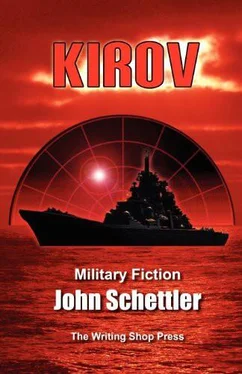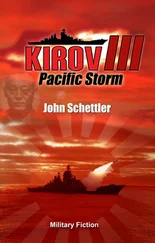John Schettler - Kirov
Здесь есть возможность читать онлайн «John Schettler - Kirov» весь текст электронной книги совершенно бесплатно (целиком полную версию без сокращений). В некоторых случаях можно слушать аудио, скачать через торрент в формате fb2 и присутствует краткое содержание. Жанр: Фантастика и фэнтези, Альтернативная история, на английском языке. Описание произведения, (предисловие) а так же отзывы посетителей доступны на портале библиотеки ЛибКат.
- Название:Kirov
- Автор:
- Жанр:
- Год:неизвестен
- ISBN:нет данных
- Рейтинг книги:5 / 5. Голосов: 1
-
Избранное:Добавить в избранное
- Отзывы:
-
Ваша оценка:
- 100
- 1
- 2
- 3
- 4
- 5
Kirov: краткое содержание, описание и аннотация
Предлагаем к чтению аннотацию, описание, краткое содержание или предисловие (зависит от того, что написал сам автор книги «Kirov»). Если вы не нашли необходимую информацию о книге — напишите в комментариях, мы постараемся отыскать её.
Kirov — читать онлайн бесплатно полную книгу (весь текст) целиком
Ниже представлен текст книги, разбитый по страницам. Система сохранения места последней прочитанной страницы, позволяет с удобством читать онлайн бесплатно книгу «Kirov», без необходимости каждый раз заново искать на чём Вы остановились. Поставьте закладку, и сможете в любой момент перейти на страницу, на которой закончили чтение.
Интервал:
Закладка:
Ten minutes ago they had force five winds and rising seas, yet now the ocean was still and calm, almost glassy smooth. The long forward bow of the ship stretched out before him, its sharp prow cutting smoothly through the jade green water, and yes, that was fog ahead, thick, gray-white fog in a misty rolling cloud bank right across his intended course.
His first appreciation of the situation was that there had been an accident aboard Orel, just as it was said there had been an accident aboard the Kursk, the last doomed sub of her class. Rudnikov had reported trouble with one of his torpedoes, and he thought it had detonated. The Orel would have been cruising at no more than 200 feet depth, and if a 15 kiloton nuclear warhead had indeed detonated he should be seeing a vast spray dome forming at the water surface, a rising gas bubble, and a great chimney of violence pluming up from the depths of the sea. That weapon was on the same scale as the bomb the Americans had dropped on Hiroshima. Yet he saw nothing, just as the Rodenko saw nothing on his radar screens, just as Tasarov heard nothing on his sonar.
A tone sounded on the ship’s intercom and the Admiral’s eyes glanced up at the overhead speaker, immediately recognizing the voice of Chief Engineer Dobrynin. “Bridge, this is Engineering. We seem to be having a problem with the reactors.”
Volsky was up quickly, reaching for the microphone and thumbing the switch to speak. “Flag Bridge responding. What is your problem, Chief?”
“Well, sir, we seem to be getting some odd readings.”
“Radiation?”
“No sir, the cores are stable and there is no radiation leak…But we are getting some unusual thermal neutron flux measurements-nothing critical, just unusual. Can we reduce speed? I’d like to take a closer look and see what happens if we lower the power output.”
“Very well, chief,” said Volsky. “Keep me informed.” Then to his helmsman he said: “Ahead one third. Slow the ship down.”
“Ahead one third, sir,” the helmsman made a quick reply, the big turbines beneath them slowing their rotations as the ship glided more gracefully forward, her bow spray diminishing in the calm seas.
“Mr. Nikolin, signal the Slava to advise us of their current position at once.”
“Aye, sir.” The radioman began intonating his hail. “Task force flag to target, come in please. Advise current heading, course and speed…” There was nothing but static on his headphones, and no answer from Slava.
“Secure from active sonar. Now you can listen again, Tasarov,” said the Admiral. “Let me know the instant you have a fix on either Slava or Orel. Mister Nikolin, hail both ships. If you do not receive an answer within five minutes then contact Severomorsk. Advise them we have canceled the exercise. Note that we are investigating an emergency situation, and that we have lost position fix and contact with Orel and Slava. Asked them if these ships have reported home.”
He turned to find Captain Karpov and Chief Orlov. “Gentlemen, please join me in the briefing room.”
The three men proceeded to a secure room off the citadel, the eyes of the ever more nervous bridge crew following them as they went. Once inside the Admiral closed the door and leaned heavily on the table. “Your thoughts, Captain,” he said following proper protocol in engaging Karpov first.
“I did what I thought most appropriate, sir.” Karpov defended himself immediately. “There was clearly an explosion of some kind, and it appeared to me that it may have been a detonation from a torpedo. I took evasive action as specified by command procedures.”
“That is not what I am asking you,” said the Admiral. “Do you not find it even passing strange that a moment ago we were sailing in rising winds and seas, and now we're looking at calming conditions and fog? Did this explosion chase the wind away? Where's the weather front Rodenko has been warning us about for the last two hours? Did you notice the barometer? It was at 990 millibars and falling, but has now risen to well over 1000.”
“But Admiral, we saw it, felt it!” Gennadi Orlov, the ship’s Chief of Staff seemed to side with Karpov on the matter. ”There was a detonation of some kind.”
“Yes, I felt that as well. The shock wave nearly threw me against the bulkhead. My first thought is that something had happened to Orel, and the fact that we have no fix on her position now leads me to think Rudnikov may have had more of a problem than he was letting on. Yet if one of his warheads went off we should still see it well above the surface.”
“You think one of his missiles exploded, sir?”
“It has happened before,” said Admiral Volsky. “Do you forget what happened to the Kursk?”
“I remember only too well what happened to the Kursk,” said Karpov, his voice laden with sarcasm. “It was attacked by an American submarine. Then the families were paid off with blood money shipped over from Washington.”
Volsky frowned. Many in the navy knew the real reason Kursk had sunk, but few would have been brazen enough to state it as Karpov had. The Admiral shook his head. “That aside, what happened to the weather? I have known conditions in the Arctic seas to change suddenly, but never like this.”
“Clearly, we need more information, Admiral.” Karpov folded his arms, a worried look on his face, his eyes darting this way and that as he considered. The logic of what the Admiral had asserted was plain to him, but it made no sense.
“There has to be something wrong with the ship’s sensors,” said Orlov. “This was no ordinary explosion. It was very energetic, and we may have sustained damage. Yes, I feel it may have been a nuclear detonation, sir. Perhaps there is nothing on Rodenko's screen because his systems are all whacked up.”
“Perhaps, but I do not need the Rodenko’s radar system to tell me what the weather is like,” said Volsky. “We will get the equipment sorted out, but for now we will proceed to rendezvous with Slava's last known position. It may be that Orel was damaged herself, and is not able to communicate, perhaps she has even suffered a more grievous fate. We will not know that anytime soon. But what we do know is that the cruiser Slava should be south of our position towing targeting barges, easy enough to find.”
“Then why can't we see her on radar, sir?” said Karpov.
“It's the equipment, I tell you.” Orlov was adamant. “There was an electromagnetic pulse of some kind. It may not have been strong enough to disable our systems, but there could be damage.”
Orlov was a practical man, big, rough hewn, and easily irritated. Yet he held his emotions tightly in hand in spite of the obvious danger inherent in the situation. Something had exploded. Something was wrong. His was a mind and hand that would first reach for a wrench or spanner to fix the problem. Afterwards he would find out who was responsible and grill them to a hard char. His thick woolen cap was pulled low on his forehead, heavy brows frowning as he spoke. And when he mentioned possible damage, the Admiral could also perceive just a hint of blame in his voice, as if Orlov was already running down the system maintenance roster in his mind, looking to single out an unfortunate mishman, or midshipman, to goad and blame for the mishap.
“Very well,” the Admiral intervened. “Initiate full, ship-wide systems checks. Every system, every component. Then, until we hear from Severomorsk, we will continue south to rendezvous with Slava's last known position. If there was such a pulse as you describe, Orlov, then she may have sustained damage as well. This would account for the radio silence.”
“But it could be an attack, Admiral.” Karpov still had a nervous, anxious look on his face.
Читать дальшеИнтервал:
Закладка:
Похожие книги на «Kirov»
Представляем Вашему вниманию похожие книги на «Kirov» списком для выбора. Мы отобрали схожую по названию и смыслу литературу в надежде предоставить читателям больше вариантов отыскать новые, интересные, ещё непрочитанные произведения.
Обсуждение, отзывы о книге «Kirov» и просто собственные мнения читателей. Оставьте ваши комментарии, напишите, что Вы думаете о произведении, его смысле или главных героях. Укажите что конкретно понравилось, а что нет, и почему Вы так считаете.












